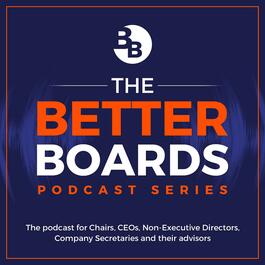
Overcoming misconceptions and lies in the boardroom | Professor Alex Edmonds, London Business School
Send us a text When pressures mount, Boards often default to easy narratives. Yet, today more than ever, it is important for Boards to pursue the uncomfortable truths. Critical thinking, discernment, and strategic dissent are key advantages Boards want to cultivate and celebrate. In this podcast, Dr Sabine Dembkowski, Founder and Managing Partner of Better Boards, connects with Alex Edmans, Professor of Finance at London Business School. Alex holds a PhD from MIT and was previously a tenured professor at Wharton and an investment banker at Morgan Stanley. An in-demand speaker, Alex also serves as a Non-Executive Director of various high-profile organisations and a Fellow of the British Academy and of the Academy of Social Sciences. “Rather than making broad claims … what I try to do is be more granular and look at the specific … dimensions that pay off.” Alex sees Boards falling into common traps by failing to appreciate and acknowledge the nuances. Is sustainability universally and unequivocally the right path forward in all situations and at all times? Stated in this way, it is clear that the answer is no, yet boardrooms around the world hesitate to raise even slight amounts of dissent or debate. It is the same with other situations Boards face. A lack of consideration for specificity, nuance, and the latest peer-reviewed research sets Boards up to be victims of trendy thinking, unprofitable generalities, and unproductive solutions. “Think critically. If there is a study, think about “Are there alternative explanations for that result?” Alex believes boards can avoid intellectual traps by engaging in critical thinking and intentional questioning. Look for alternative explanations to prevent being misled by industry headwinds or tailwinds, to avoid confusing rare talent with repeatable success, and to guard against internal biases. Imagine the opposite of the result presented in any given study – would the reaction be the same? Even this simple challenge can be enough to reawaken discernment and activate critical thinking pathways. It helps separate signal from noise. “Actively seek dissent, reward it, and be wary of the fact that you as Chair … might unintentionally reduce dissenting opinions.” Chairs play a special role in fostering debate and discernment. Alex advises Chairs to refrain from giving their opinion first, create space for other views and avoid anchoring topics on “approved” outlooks. Further, when dissent or objections are overruled, reinforce that there was value in the conversation even if the decision went in a different direction. “Every company says we value a diversity of opinion, but when the rubber hits the road, how many of them act in that way?” Alex sees some companies treat dissent like a luxury reserved for good times. Yet, tough times are when honest debate and differing viewpoints matter most. He acknowledges this is not easy. Simple to say, but not easy to do. Still, defaulting to the status quo is the ultimate risk. You want to be different from your competition. The three top takeaways from our conversation for more effective boards are: 1. Academic research matters. 2. Critical thinking matters. Question the things you want to be true. 3. Encourage dissent within others. If you would like to become part of the Better Boards community, learn about our distinctive approach and explore opportunities to work with us or contribute to The Better Boards podcast series, get in touch at info@better-boards.com. We love to hear from you.
From "The Better Boards Podcast Series"


Comments
Add comment Feedback